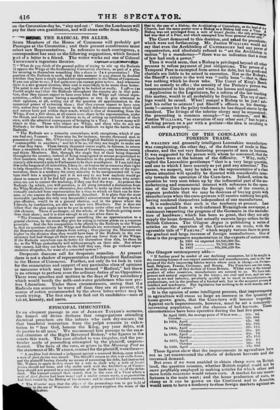THE RADICAL PIS ALLER.
SOME Members of the House of Commons will probably get Peerages at the Coronation ; and their present constituents must select new Representatives. In reference to such contingency, a correspondent has sent us the following suggestions, which formed put of a letter to a friend. The writer works out one of Colonel
IstomrsoN's ingenious theories. seswesseass. eat:maw page
.7." What do you think of the general policy of trying to stir up the Radicals to oppose the Whigs at the forthcoming Coronation elections, as part of a plan for securing to themselves something like a share in tie r .presentation The position of the Radicals is such, that at this moment it may almost be doubted whether they have a single unshackled representative in the House of Commons. If you can point to one, I feel quite sure you cannot point to two. And whenever there is a new general election, their case is rnorelikely to be worse than better. The point is one of cool theory, and ought to be looked at coolly. I affirm (as Euclid might say) that the Radicals throughout the country are in that posi- tion, that they cannot expect to have even what the Whigs call virtual repre- sentation,—which means having a mouthpiece or ttvo to give utterance to their opinions, at all, setting out of the question all approximation to the numerical power of entorciog them ; that they cannot expect to have even this, unless they will have recourse to the only defensive measure which God and nature have put within their reach, which is that of demanding from the Whigs, if not a fair share, at all events some share in the representation, under the threat, and execution too if driven to it, of setting up candidates of their own, with the admitted consequence of bringing in a Tory. I know many will object to this. Those who object are Whigs, and those who do not are Radicals ; let there be no ill-humour that as Radicals we fight the battle of the Radicals.
" The Radicals are a minority everywhere, with exceptions, which if you can find out, I cannot. There may be, for instance, twenty thousand men in possession of votes. Mr. O'CousiEr,e. says the English Radicals in particular are contemptible in numbers;' and let it be so, till they are taught to make use of what they have. These twenty thousand voters ought, in fairness, to return from a twentieth to a thirtieth of the House of Commons,—say between twenty and thirty Members. But, through the single fact of their being dispersed throughout the country, instead of being congregated in masses proportioned to their numbers, they may and do find themselves in the predicament of being scarcely able to send a man to Parliament to be their mouthpiece. If I am told that this is the bargain of all minorities, I deny it—at least so far as concerns their right to help themselves if they can. It is true, that in the existing state of the repre- sentation, there is a tendency for every minority to be unrepresented till it can turn itself into a majority ; and it is not easy to say how anybody would go about to remove it if be had full powers. But this is not a reason why mino- rities are not to correct the tendency, if they can find the way. At present the Radicals (by which, you will perceive, is all along intended a distinction from the Whig- Radicals) have no alternative, but either to make up their minds to be virtually excluded from representation for a time to which no limit can be fore- seen, or else assume the defensive attitude described. It is plain that the most favourable (perhaps the only very favourable) circumstances for making such a plan effective, would be at a general election, and in the places where the Liberals, by combination, are able to return two Members. But it does not follow that the plan ought not to be put in action under other and less favour. able chances. There is no danger, on the whole, of the Radicals getting more than their share; and it is time enough to cry out when there is. "The Coronation elections present something. like an approximation to a general election, by the room they give for acting in various places on a common principle. And the fair composition to be offered by the Radicals to the Whigs is, that on questions where the Whigs and Radicals are notoriously at variance, the Representative should abstain from voting ; thus placing the Ministers one higher on the division than they would have been if the Radicals in the con- stituency had had things all their own way, and one lower than If the Whigs. If the Radicals anywhere can do better for themselves than this, let them do it ; as the Whigs undoubtedly will without scruple on their side. But where they cannot, had they not better do the half they can, than go without repre- sentation altogether, for want of a concerted system? " Desperate diseases call for desperate remedies. At present there is not a shadow of representation of Independent Radicalism in the House of Commons. Further, not only do we look in vain for the enunciation and support of any particular class of opinions or measures which may have been termed "Radical," but there is no attempt to perform even the ordinary duties of an Opposition. There were speeches and motions in the days of Tory ascendancy which would terrify the milk-and-water gentlemen who now pre- fess Liberalism. Under these circumstances, seeing that tl.e Radicals can scarcely be worse off than they are at present, tl e course of action recommended by the above letter-writer may be worth trying. The first step is to find out fit candidates—men of tale nt, honesty, and nerve.


























 Previous page
Previous page